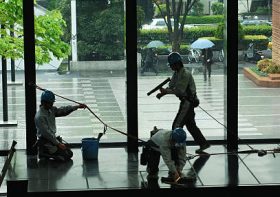Breathing without living: the plight of Christians in Pakistan

In the diverse tapestry of Pakistan, where various ethnicities, religions, and cultures coexist, the Christian minority finds itself caught in a web of discrimination and persecution. Despite constitutional guarantees of religious freedom, Christians in Pakistan face an arduous journey, navigating societal prejudices, discriminatory laws, and the specter of violence.
The Christian community, constituting a mere 1.6% of Pakistan’s population, is a religious minority in a predominantly Muslim nation. While the country officially recognizes the rights of minorities, the ground reality often tells a different story. Discrimination begins at the grassroots level, with Christians facing social exclusion and economic marginalization. Employment opportunities are limited, and many find themselves confined to low-paying jobs, perpetuating a cycle of poverty.
Blatant discrimination extends to the education system, where Christian students encounter barriers to academic success. Reports indicate cases of Christian children being subjected to bullying, harassment, and discrimination by both peers and teachers. Furthermore, the national curriculum often neglects the history and contributions of religious minorities, fostering a skewed perspective that perpetuates stereotypes.
Pakistan’s notorious blasphemy laws exacerbate the challenges faced by Christians. These laws, ostensibly designed to protect religious sentiments, have been weaponized against minorities. Accusations of blasphemy are often used as a tool of persecution, with Christians being disproportionately targeted. The mere suspicion of blasphemy can lead to mob violence, extrajudicial killings, and destruction of property.
The plight of Asia Bibi, a Christian woman who spent years on death row after being falsely accused of blasphemy, garnered international attention. While her eventual acquittal was a glimmer of hope, it underscored the fragility of the justice system and the vulnerability of Christians to baseless accusations that can shatter lives.
Churches and Christian neighborhoods have not been immune to targeted violence. Bombings and attacks on places of worship have claimed innocent lives, instilling fear within the community. The government’s response to such incidents often falls short, failing to provide adequate protection or bring perpetrators to justice. This lack of accountability further deepens the sense of insecurity among Christians.
The forced conversion of Christian girls to Islam remains another harrowing issue. Reports suggest that young Christian girls are abducted, forcibly converted, and often married off to Muslim men. The legal system, instead of protecting these vulnerable individuals, sometimes colludes with the perpetrators, denying justice to the victims.
Despite these challenges, the Christian community in Pakistan remains resilient. Churches serve as not just places of worship but also as hubs for social support and solidarity. Christian leaders tirelessly advocate for the rights of their community, challenging discriminatory laws and seeking a more inclusive society.
International pressure and advocacy play a crucial role in addressing the plight of Christians in Pakistan. The global community must continue to raise awareness about the challenges faced by religious minorities and press the Pakistani government to uphold its commitment to religious freedom. Diplomatic efforts should encourage legislative reforms, ensuring that discriminatory laws are amended or repealed.
In conclusion, the plight of Christians in Pakistan reflects a larger struggle for religious freedom and tolerance. While the challenges are daunting, the resilience of the Christian community and the support of the international community offer hope for a more inclusive and equitable future. Breathing without living may persist, but the quest for a life free from persecution and discrimination must endure.




Leave a Reply